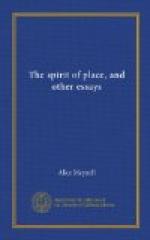It is true that Crabbe read and quoted Milton; so did all his contemporaries; and to us now it seems that poetry cannot have been forgotten by any age possessing Lycidas. Yet that age can scarcely be said to have in any true sense possessed Lycidas. There are other things, besides poetry, in Milton’s poems. We do not entirely know, perhaps, but we can conjecture how a reader in Crabbe’s late eighteenth century, looking in Milton for authority for all that he unluckily and vainly admired, would well find it. He would find the approval of Young’s “Night Thoughts” did he search for it, as we who do not search for it may not readily understand. A step or so downwards, from a few passages in “Paradise Lost” and “Paradise Regained,” an inevitable drop in the derivation, a depression such as is human, and everything, from Dryden to “The Vanity of Human Wishes,” follows, without violence and perhaps without wilful misappreciation. The poet Milton fathered, legitimately enough, an unpoetic posterity. Milton, therefore, who might have kept an age, and many a succeeding age, on the heights of poetry by lines like these—
Who sing and singing in their glory move—
by this, and by many and many another so divine—Milton justified also the cold excesses of his posterity by the example of more than one group of blank verse lines in his greatest poem. Manifestly the sanction is a matter of choice, and depends upon the age: the age of Crabbe found in Milton such ancestry as it was fit for.
Crabbe, then, was not a poet of poetry. But he came into possession of a metrical form charged by secondary poets with a contented second-class dignity that bears constant reference, in the way of respect rather than of imitation, to the state and nobility of Pope at his best—the couplet. The weak yet rigid “poetry” that fell to his lot owed all the decorum it possessed to the mechanical defences and props—the exclusions especially—of this manner of versification. The grievous thing was that, being moved to write simply of simple things, he had no more supple English for his purpose. His effort to disengage the phrase—long committed to convention and to an exposed artifice—did but prove how surely the ancient vitality was gone.
His preface to “The Borough, a Poem,” should be duly read before the “poem” itself, for the prose has a propriety all its own. Everything is conceived with the most perfect moderation, and then presented in a form of reasoning that leaves you no possible ground of remonstrance. In proposing his subject Crabbe seems to make an unanswerable apology with a composure that is almost sweet. For instance, at some length and with some nobility he anticipates a probable conjecture that his work was done “without due examination and revisal,” and he meets the conjectured criticism thus: “Now, readers are, I believe, disposed to treat with more than common severity those writers who have been led into presumption




